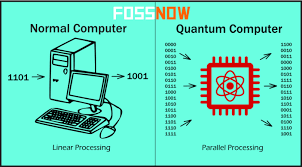Latest news about Bitcoin and all cryptocurrencies. Your daily crypto news habit.

‘If you can fathom quantum mechanics without getting dizzy, you don’t get it.’― Niels Bohr
Beethoven’s Replacement
The advancements the world is undergoing in regard to quantum information systems is unprecedented. Moore’s law, the theory formulated by Gordon Moore, an American engineer, businessman and the co-founder of the Intel Corporation, states the number of transistors in a dense-integrated circuit doubles approximately every two years.
That was then but this is now, though.
Move over, Beethoven.
Late last year, computer scientists working at Google did some calculations on the company’s most advanced quantum processor. Strangely, they managed to achieve the same calculation on a regular laptop. A month or so later, at the beginning of 2019, they carried out the aforesaid test on a better quantum chip. Unsurprisingly, they were forced to carry out the test on a much more advanced and powerful computer in order to get the same results as previously done. Again, a few weeks after that they ran the experiment once more but were unable to simulate the results on any form of computer at hand, even the most powerful one. To complete the testing, drastically, they had to use Google’s server to complete it.
Call it desperate measures.
Enter Hartmut Neven
Technology is moving forward like a tsunami and we better be ready for it. The exponential growth of quantum architectural systems in recent times is a surprise to many.
 Hartmut Neven. Source: cio.com
Hartmut Neven. Source: cio.com
The man responsible for all this, Hartmut Neven, director of the Quantum Artificial Intelligence Laboratory, has even got a new law named after him for his efforts: Neven’s law, which is basically the surmise how quickly quantum computers are gaining supremacy against their classical brethren.
It’s Moore’s law 2.0, a kingsize improvement on technological advancement that will only grow as the quantum chips become better, faster.
Watch this space.
Neven said:
“It looks like nothing is happening, nothing is happening, and then whoops, suddenly you’re in a different world. That’s what we’re experiencing here.”
Unlike Moore’s law, whose exponential growth was counted in years, every two years, in fact, Neven’s law is inexplicable in the speed of its growth. Improvements in performance are ‘doubly exponential’, meaning they increase by powers of two. Upgrades in quantum processing power can seem slight at first, not imperceptible in performance, but later ones are clearly noticeable in computational speed, resulting in enhanced quantum execution.
The power of quantum computers over classical models comes down to two factors: the first of these is that a qubit has four times more computational power than a normal bit, which is a binary piece of information, based on the binary or base 2 numeral system, as a circuit on a quantum model has, say, four qubits, it would take sixteen ‘normal bits’ to achieve the same computational results on a classical computer, or something to that effect.
Secondly, is the speed at which quantum computer processing power is improving at a lightning pace. The chips in the processors are exponentially getting better with time and at a greater rate than processors did in the classical age of computers. This has seen vast upgrades in performance power and the error rate in the quantum computers — a big problem in earlier models of quantum information systems — being reduced. Quantum error reduction, so important in sustaining the qubits superposition and entangled states, is the key technical conundrum in moving the technology forward and taking the architectural systems out of the university and research labs and into the realm of real, utilitarian applications that can improve our lives and help humanity.
Viva The Classical Computer!
There are quite a few people, however, who believe that classical computer models still have their uses and are not as redundant as those computer scientists and physicists supporting quantum computers say. Advocates believe, in light of the approaching redundancy of Moore’s law, that classical computer chips and more coherent and efficient algorithms are also improving, which will only enhance classical computers lifespan.
The road ahead, the target researchers and developers are reaching towards, is ‘quantum supremacy’. This term, this technological position or state of mind, if you will, has so far has eluded us.
To get there is problematic, but if anyone is going to, then IBM, Google or any of the other companies interested in steaming ahead, should, with the right attitude and people on board, get closer to the goal.
It is obvious that as chips become better, quantum computers will become faster and faster, and will, no doubt, be able to solve problems that even the most powerful of supercomputers on the planet won’t have a chance of solving. It is only a matter of the number of qubits available, and the error rate reduction established within the confines of the quantum architectural system against the operational fluidity of the operations.
Let us, then, at least for the time being, clap and congratulate Mr Hartmut Neven on his achievements: it is not every day that a town, a street, or even a law as in Neven’s case, gets named after you. Basking in such adulation can go to some people’s heads, but I would put a question mark on the German academic resting on his laurels.
I’m sure, this is nothing to him, and discovering practical solutions to the hard problems of quantum computers is more of a motivation for his quest for scientific truth than any base accolade or hubristic accomplishment.
Neven’s Law: Paradigm Shift in Quantum Computers was originally published in Hacker Noon on Medium, where people are continuing the conversation by highlighting and responding to this story.
Disclaimer
The views and opinions expressed in this article are solely those of the authors and do not reflect the views of Bitcoin Insider. Every investment and trading move involves risk - this is especially true for cryptocurrencies given their volatility. We strongly advise our readers to conduct their own research when making a decision.
